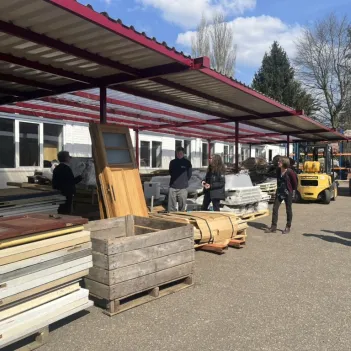CirCoCreation
Closing the gaps between stakeholders for successful and sustainable urban Circular Construction initiatives through Co-creation

© CirCoCreation
- Category
- Project
- Call
- DUT Call 2023
- Duration
- –
- Project coordinator
- Katholieke Universiteit Leuven
CirCoCreation tackles the pressing challenge of implementing circular economy principles in urban construction, focusing on the reuse, recycling, and redesign of building materials. Despite growing interest in sustainable practices, cities face technological, institutional, and societal barriers that hinder the uptake of circular strategies. A key issue is the lack of broad stakeholder and citizen integration into top-down policy and trust in ongoing bottom-up initiatives, which limits the scalability and systemic impact of urban circular construction initiatives (UCCI).
The project addresses the fragmented ecosystem and the absence of effective participatory models. It aims to bridge gaps between policymakers, industry, citizens, and researchers by fostering co-creation and collective intelligence. The research question centers on developing inclusive, replicable, context-adapted and sustainable UCCI and accompanying monitoring tools that promote long-term socio-economic and environmental benefits. CirCoCreation seeks to understand the complex interplay between people, materials, and urban environments to support a resilient circular construction transition.
CirCoCreation proposes a transdisciplinary, stakeholder-driven approach to co-create urban circular ecosystems. Through living labs in Belgium, Sweden, and France, citizens, UCCIs, companies, and governments will collaboratively design and test circular construction solutions, monitoring tools and collaborative systems. These labs will integrate technical innovation—such as recyclable bio-based materials—with participatory design processes. New metrics will be developed to monitor societal and environmental impact, material flows and stakeholder interactions, enabling better decision-making.
We will also implement a Theory of Change framework to map pathways from intervention to impact, ensuring social dynamics and behavioral factors are considered. Artistic workshops and exhibitions will engage the public and valorize outcomes. By embedding co-creation at every stage—from ideation to implementation—CirCoCreation aims to overcome barriers to circularity and foster long-term partnerships. The initiative will generate tools, data, and models that inspire stakeholders to actively engage in urban circular construction.
CirCoCreation is expected to generate transformative impacts across social, environmental, and economic domains. City governments will gain tools and metrics to monitor circular initiatives, enabling data-driven policy and better integration of bottom-up efforts. Citizens and construction sector stakeholders will be inspired to engage in reuse and recycling, fostering community cohesion and sustainable behavior. SMEs and urban resource hubs will benefit from new business models and collaborative strategies that enhance long-term viability. Environmentally, the project will contribute to reducing resource consumption and waste by extending the lifecycle of materials. Economically, it will support innovation in product and system design, and stakeholder engagement, leading to future-proof solutions. Scientifically, CirCoCreation will advance knowledge on urban circular ecosystems. The Theory of Change will serve as a replicable framework for guiding urban circular transitions. Artistic valorization will amplify public outreach, making circularity tangible and inclusive. Overall, the project will help cities become more resilient, inclusive, and circular.
Belgium
France
Spain
Sweden
Art & Science International Institute, Mittuniversitetet, Universidad Complutense De Madrid
Atelier Circuler Vzw, Flooré Ab, Re-Board Technology AB, Stad Leuven, Sundsvalls kommun
Project Video
Connect to YouTube?
To play this video, a connection to YouTube will be established, and personal data will be transmitted to YouTube.
Links
Contact
Hanne Vrebos
hanne.vrebos@kuleuven.be